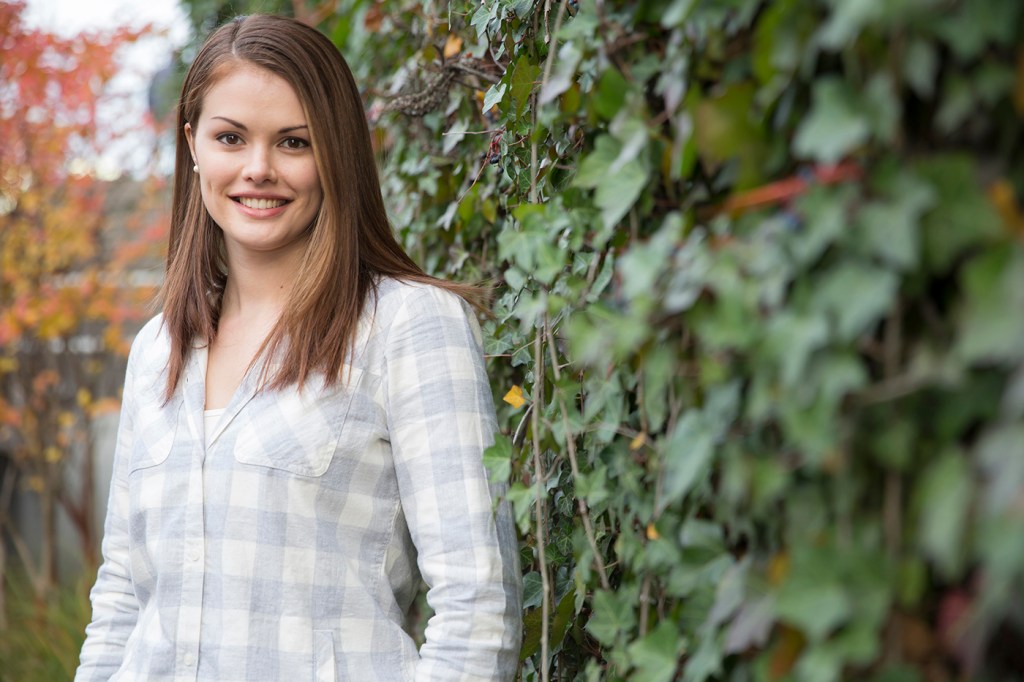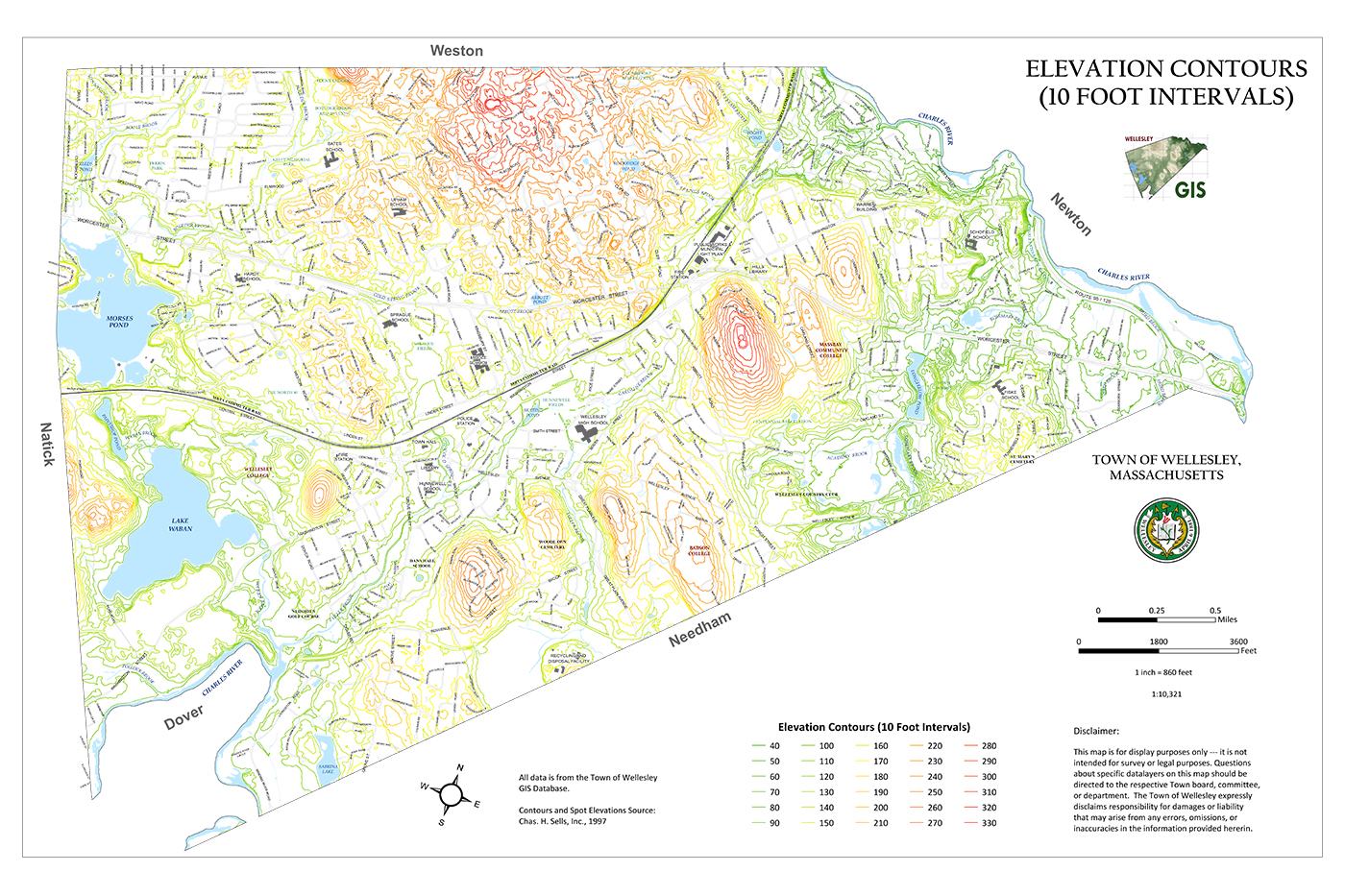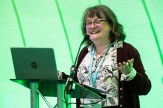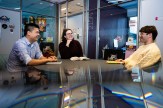Former US Navy linguist finds her calling at Northeastern

The moment Sarah Nelson, S’17, stepped onto the Northeastern campus, she knew that the university spoke her language.
A linguist with the U.S. Navy for six years, Nelson was drawn to Northeastern for its academic strength in her areas of interest, which are physics and geology, its co-op program, and its longtime commitment to supporting the education and career advancement of military veterans. “Coming to Northeastern was a no-brainer,” says Nelson, who was 24 when she started college, in 2013. “The assistance to veterans, both financial and in terms of services, is remarkable.”
The Post-9/11 GI Bill covered a portion of Nelson’s tuition and fees, but it was Northeastern’s generous contribution to the federal government’s Yellow Ribbon Program that will enable her to graduate debt free.
“Because I am an older student, I came to college with various financial commitments,” says Nelson. “Having my educational costs taken care of by Northeastern and the Department of Veterans Affairs was a huge plus. I could concentrate on my studies stress-free.”
Marrying science to art
Those studies were beyond her ken 11 years ago.
Nelson grew up in Gresham, Oregon, and joined the Navy at 17 right out of high school, unsure of her future direction. Her aunt had served as a linguist in the military for 21 years and encouraged Nelson to take the Defense Department’s language aptitude test.
Coming to Northeastern was a no-brainer. The assistance to veterans, both financial and in terms of services, is remarkable.
Sarah Nelson
S'17
Nelson earned a high score and embarked on a service-oriented path: She attended boot camp at the Navy’s Recruit Training Command, in Great Lakes, Illinois, and then studied Farsi at the Defense Language Institute Foreign Language Center, in Monterey, California, for a year. “Given the conflicts in Afghanistan and Iraq, most of the linguists were learning Arabic or Farsi,” she says.
For the next five years she was stationed at the National Security Agency base in Fort Gordon, Georgia, where she translated documents from Farsi to English. When her contract was up, she decided not to re-enlist. “I liked the job but I didn’t want to do it forever,” she says. “By that time I knew I wanted to get a degree related to geophysics.”
Geophysics, the study of the physical processes and properties of the Earth as well as the surrounding space environment, would permit her to combine her passion for science with her passion for art—she is also a painter, primarily of watercolors. After graduation she hopes to work with geographic information systems to map geographic data, revealing relationships, patterns, and trends within them. “I love designing maps, making them aesthetically pleasing as well as accurate,” she says.
Her Northeastern co-op with the Department of Public Works for the town of Wellesley, Massachusetts, gave her the opportunity to dive into digital mapping. “It was perfect,” she says. “They needed someone to work with the Water and Sewer Division in conjunction with their GIS experts to develop maps to give to contractors and update the data network tracking all the utilities in the town.”

Map developed by Sarah Nelson using the Town of Wellesley’s GIS database. Such flow analysis helps the town identify problem areas in terms of salt concentration, pollutants, and potable water quality. Image courtesy of the Town of Wellesley.
Nelson cites a Dialogue of Civilizations in Iceland in 2015, where she learned about volcanic and glacial processes, as another high point in her undergraduate career. She was able to have that global experience thanks to a Phi Gamma Pi Veterans Scholarship, which came from a fund from the former Northeastern fraternity.
“The dialogue was wonderful,” says Nelson. “We camped in different sites around Iceland for five weeks, starting in Reykjavik and traveling through the middle of the island and then down the east side by the glaciers, taking field notes and mapping geological findings.”
Specialized services for veterans
Northeastern’s interdisciplinary, experiential bent and generous financial support aren’t all that set it apart for veterans, says Nelson.
“In the military, a lot of your life is regimented and controlled, so adapting to civilian life was difficult at first,” says Nelson. “But Northeastern has a huge veterans’ community and offers all sorts of services and advising to help you acclimate to life at the university.”
Chief among the organizations providing those benefits are the Center for the Advancement of Veterans and Servicemembers, the Student Veterans Organization, and the Northeastern Veterans of Foreign Wars post—only the second VFW post to be run by student veterans on a college campus.
CAVS, which was launched in 2015, focuses on student veterans’ transition to civilian life, including employment, mentorship opportunities, and tailored experiential learning programs. SVO fosters community among student veterans, acts as an advocacy group, and plans and runs events.
“Sarah’s a great example of why a Northeastern education can be truly transformational for veterans,” says Andrew McCarty, director of CAVS, a post-9/11 veteran of the U.S. Air Force, and a Northeastern graduate. “I’ve spoken to veterans and servicemembers around the country who think their military occupation is some sort of forced vocation. It’s important for us to help them understand that they have the power to change direction at any time. Sarah was six years into what could have been a career as a linguist, a demanding military occupation that requires intense training. And yet her passions lay elsewhere. It’s exciting to see someone switch gears and craft the life she really wants for herself.”





